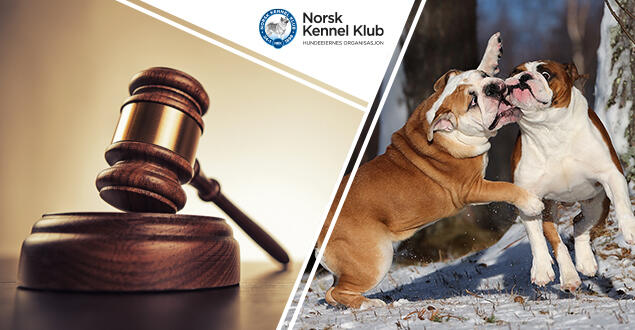Fighting for the right to breed healthy dogs

The Norwegian Kennel Club (NKK) is waiting in suspense for Borgarting Court of Appeal to deliver its judgement, which is expected to happen within a week. The NKK hopes that breeding will continue to be based on an individual assessment of each animal, not with a ban on certain breeds. The NKK is also astonished by the Norwegian Society for Protection of Animals’ personal attacks on individuals in the NKK system in connection with the court case, including making false accusations to the police against certain employees.
The experts disagree
The appeal proceedings ended in Borgarting Court of Appeal on 23 September. It became clear in court that the experts strongly disagree whether there is enough genetic variation in the breeds Cavalier King Charles Spaniel and English Bulldog to breed away from the well-documented problems that these dogs obviously have.
The expert witnesses did not agree that crossbreeding is the best way to resolve these challenges. However, both the Swedish professor Jens Häggstrøm, who studies heart disease in Cavaliers, and the British professor Jane Ladlow, who is the leading world expert on breathing problems in Bulldogs, stressed that Cavaliers and Bulldogs have made progress health-wise since breeders began systematically documenting these dogs’ disorders and paying heed to this information in their breeding activities.
Giving evidence for the Norwegian Society for Protection of Animals, Professor Odd Vangen also pointed out that it is possible to achieve progress in a population as long as it is big enough. Worldwide, there are extremely large populations of both these breeds.
Should the Animal Welfare Act be administered through civil lawsuits?
It has been important for the NKK to clarify whether it is the government-appointed administrative bodies that are meant to enforce the Animal Welfare Act, or whether the act should be administered through private civil actions. This is an important principle, and one that will apply to all forms of animal breeding and husbandry in Norway, not just dog breeding. This was also the main reason that the NKK decided to appeal the decision of the District Court.
The NKK believes that society as well as animals are best served if this remains the responsibility of the Norwegian Food Safety Authority and the Ministry of Agriculture and Food. The NKK thinks that the new regulation for dog breeding that is under preparation will be an excellent tool for ensuring sounder dog breeding practices in all situations, not simply with regard to the registered side of breeding under the auspices of the Norwegian Kennel Club. The regulation provides for individual assessments and examinations of all animals used for breeding, something the NKK considers to be a much better and sounder method than banning breeding with individual dogs based on their breed. Determining which breed they belong to would also be extremely difficult, not least when it comes to dogs that aren’t registered with the NKK or elsewhere.
Personal attacks
Throughout this process, the Norwegian Kennel Club has been subjected to what amounts to harassment in the form of personal attacks made by the Norwegian Society for Protection of Animals.
Six breeders have been involved in the lawsuit without actually having committed an offence or behaved unethically. They have lived under considerable stress for two years, simply because the Norwegian Society for Protection of Animals has wanted to bring a matter of principle before the courts. The NKK deeply regrets that these breeders have become innocent victims in all of this.
It also became known recently that the head of the Norwegian Society for Protection of Animals, Åshild Roaldset, has filed complaints with the police against two NKK employees on false grounds. The complaints were of course dismissed immediately, but the NKK is taking this matter seriously and is considering whether to pursue it at a higher level.